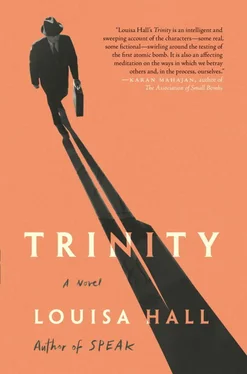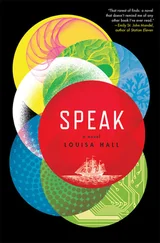Still, every so often, when someone else was telling a story, I watched him for evidence of the cruel pride Nancy described. But he never talked about the bombs. He stayed away from politics. He was soft-spoken and polite, and only at Ivan’s prodding did he start to recite one of the passages he’d memorized.
Ivan said he knew the whole Odyssey by heart, and later he stood up by the bonfire Ivan had built, with the shadows of the flames flickering over his face, and said, Sing to me of the man, Muse, the man of twists and turns .
He went on for a while, with the sound of the ocean washing behind him: Many cities of men he saw and learned their minds, many pains he suffered, heartsick on the open sea.
He knew pages and pages by heart. When he was finished, we all applauded. Ivan said he could recite any passage you requested, in any one of the eight languages he could fluently speak. We tried him for a while, and for the most part it was true. He had a genius for adopting other people’s mother tongues. He did more from Homer, a few from Proust, and The Tempest, and a poem by Donne, always speaking somewhat quietly so that we had to lean forward to hear him, and Kitty smoked cigarette after cigarette, watching him perform, resting there on the patio, temporarily at ease, like a woman who’s put aside what’s left of her weaving.
Later, when the sun had almost disappeared below the horizon, Chester stopped reciting and looked over at Alice.
You’re a painter, he said, or something like that.
She nodded, and he said, I’m going to show you something amazing.
He led the way, and she followed him over the edge of the hillside, heading down to the beach. They were gone for a while, and Kitty kept smoking and laughing with Doris and Ivan, but she never took her eyes off the place where they’d disappeared.
Later, when they came back, Alice was grinning. When she sat down beside me, she took my hand.
We sat there together all night, holding hands by the bonfire Ivan built to keep us warm, and when we got back to the hotel she couldn’t even wait until the elevator doors had closed behind us before she started kissing me.
She was holding my face in her hands, pulling me closer. In the room, we took each other’s clothes off as if we hadn’t seen each other before. Afterward, I went to sleep, and Alice started a painting. It was the first of her green flashes, the first of that profitable series of paintings.
That’s what Chester had shown her: the flash of green light that spread over the horizon just before sunset. He’d explained to her why it happened. Where the atmosphere curved close to the earth, he said, it worked as a prism. And when the sun had nearly sunk behind that curved portion, the single sun as we perceive it was divided into many suns: a red sun, a yellow sun, purple and green suns.
In that moment, we could finally see that it had never been a single sun, but instead a cloud of merging, interpenetrating bodies of color, which had only appeared like one sun because all of them were sinking at the same speed. Only then, in that last second, when the other suns of other colors had sunk below the horizon, the slowest one—the green sun, the sun most loath to leave us—was the only sun left.
According to legend, Chester told Alice, anyone who saw that green flash would never again go wrong in any matter of the heart. They watched it go dark again, then turned and came back up to the fire to join us.
WHO KNOWS WHY HE FELT SHE NEEDED TO SEE THAT GREEN FLASH.Regardless, from that point on, we were friends with Chester and Kitty. For the most part our relationship was always open and easy, though there were some subjects we tried to avoid. We never talked, for instance, about his security hearings, though I’d read about them in Washington, in the same magazines where I read about exposed Hollywood stars, or all those “political perverts.”
I could sympathize with what he’d been through. We’d stayed under the radar because we weren’t as famous as Chester and Kitty. Alice was only the arts consultant for the Library of Congress, not the father of the atom bomb. But we’d been there, in that hateful city, in that hateful time, surrounded by those magazines and the gossip in all the restaurants, and sometimes, on the island, I wondered if Alice and I could have survived what he and Kitty endured: four months, in that little room, and all those secrets tumbling out.
Out of curiosity, once, I ordered the transcripts from the library on St. Thomas. I read them at an outdoor café in Cruz Bay. It was very early one morning. I’d had trouble sleeping, so I left Alice in bed and headed to that café when the sky was still transparent as a jellyfish and shot through with veins of bright color.
The transcripts went on for hundreds of pages. It was strange to read them on that island, while the roosters were still crowing and the ocean whispered somewhere nearby. They seemed to belong to another universe entirely, those records of the legal debate on whether or not Chester was a loyal citizen of his country.
The main question, the question the lawyers continually returned to, was whether or not, as a man, Chester was fit to be trusted.
The prosecutors emphasized that he had lied to his superiors in the army, just as he had lied to several friends, and to his wife, when he went back to spend that night with his girlfriend in San Francisco.
Could a man, the prosecutors wanted to know, who could not be trusted as a friend or a husband be trusted with his country’s nuclear secrets?
Over and over again, his friends and colleagues attempted to answer in the affirmative, but the prosecutors pressed further. How can you know? they asked. How can you be perfectly sure that you know him?
And over and over again, the witnesses—his friends; even his family—were forced to admit that they couldn’t.
A Dr. Bradbury, for instance, who worked with him at Los Alamos, said: “I was not looking in his mind, and I cannot say this of course from definite knowledge. You can never say anything about a man’s loyalty by looking at him, except what you feel.”
Reading his answer, I felt a little creeping despair in my stomach. I began to feel as though my coffee might crawl back up my throat.
For some reason, it settled my stomach to start taking notes, so I wrote down Dr. Bradbury’s answer on the paper napkin that came with my coffee. I wrote down what Edward Teller said, also: “In a great number of cases I have seen Dr. Oppenheimer act—I understood that Dr. Oppenheimer acted—in a way which for me was exceedingly hard to understand.” And later: “To this extent, I feel that I would like to see the vital interests of this country in hands which I understand better, and therefore trust more.”
I covered that napkin with lines, then went to the counter and picked up a fresh bundle of napkins, and as I continued to read, I kept taking notes. “How did you know him?” the defense lawyer asked a man named Dr. Latimer.
“Various things,” he answered, “that go into a man’s judgment are sometimes difficult to analyze.”
“I am trying to figure out,” the defense lawyer said, “to what extent objective facts—”
But Dr. Latimer interrupted. “I had studied this influence Dr. Oppenheimer had over men. It was a tremendous thing.”
“When did you study this influence?” the defense lawyer asked.
“All during the war and after the war. He is such an amazing man that one couldn’t help but try to put together some picture.”
On and on, the interrogation continued. I covered the whole stack of napkins, while more and more probingly, the lawyers for both the prosecution and the defense questioned droves of witnesses about whether or not Chester’s true nature could ever be known, and therefore trusted.
Читать дальше












